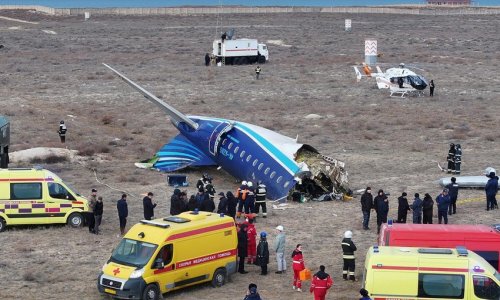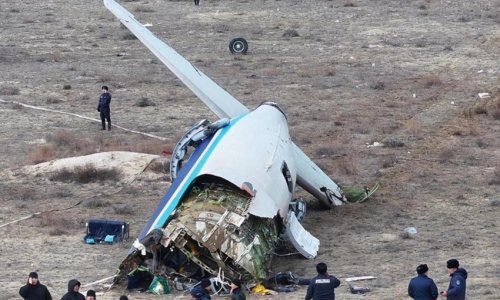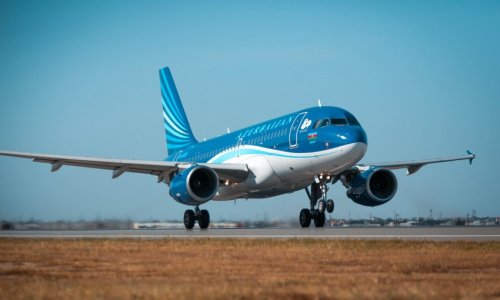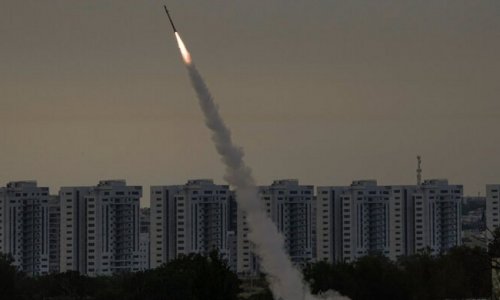The people of Crimea have voted to become part of Russia in a bitterly disputed referendum. It's a region that has huge significance in the Russian psyche. Why?In 1893, Maximilian Voloshin's mother bought a plot of land in a little Crimean village called Koktebel. The Kiev-born Voloshin, a poet and philosopher, built a house on the waterfront and would invite his friends, poets, artists, writers, from Moscow and St Petersburg, to stay for months at a time during the first three decades of the 20th Century.The poet Marina Tsvetaeva met her husband Sergei Efron on the beach at Koktebel when they were teenagers. Poets Anna Akhmatova and Osip Mandelstam both spent time with Voloshin. Away from the city, in a tiny backwater, the artists could be bohemian - wear their hair long, or cut it short and shock the locals. Koktebel became, and to a degree remained, an artists' colony.Part of the appeal of Crimea for Mandelstam and Tsvetaeva was its exotic, Muslim atmosphere. Mandelstam's poem Feodosia is an ode to the Tatar town of Kaffa.Surrounded by tall hills,Like a flock of sheep you run down the mountain,And sparkle like pink and white stones in the dry, transparent air.Pirates' feluccas rock back and forth,Flags like poppies set alight the Turkish port,Cane-like masts, elastic crystal of a wave,And boats hanging like hammocks from ropes.For Tsvetaeva and Mandelstam, the Black Sea and Crimea were fascinating and exotic, worlds away from Moscow, an idyllic, pre-lapsarian, pre-revolutionary time and place they return to in their poetry.Voloshin's artists' colony inaugurated a century of Crimea as holiday destination. His love of walking and other outdoor pursuits, and the upper class fashion for taking the waters in health resorts were metamorphosed into holiday camps and spa retreats for the new Soviet masses.The Soviet dream of creating an ideal Communist proletariat found much more traction when offered up in organised free leisure, rather than the Five Year Plan.The Soviet Union saw the peninsula transformed into a summer camp for rewarded workers and spoiled apparatchiks. Tens of thousands of children descended to stay in purpose-built sanatoria, and holiday camps such as the famous Artek, to enjoy two weeks of sun, sea and indoctrination through sport and leisure.In Feodosia, mansions built in the late 19th Century by Karaite Jews - Jews of Turkic origin who were patronised by the imperial elite - were converted into sanatoria. Today, both these palaces and the Soviet sanatoria are falling into ruin.For anyone born in the Soviet Union, Crimea is holiday-land. Crimea is the southern promise of freedom, of sensuality, an ideal time and place, outside "real life", to enjoy sun, sea, mountains, sports, exotic food, rambling, gambling, whatever takes your fancy. The Soviet fashioning of Crimea as a mass image of desire was completely successful, and still remains powerful, despite competition since the end of the Soviet Union, from cheaper, better equipped resorts in nearby Turkey.For both Imperial Russia and then the Soviet Union, Crimea was a route to the Mediterranean - the Classical world as well as that of blue skies and sunbathing. But Crimea's attractions are real. Every kind of landscape is condensed into this little diamond: from Crimean steppe (prairie) in the East and North, sandy beaches at Feodosia, to rolling hills of vineyards and fruit trees, and spectacular cliffs dropping into the deep warm sea. Further West a forested mountain range hides ancient cave cities, and fairytale castles hang at the cliff's edge.The Russian imperial family began coming to Crimea on holiday in the 1860s and the last tsar Nicholas II built a palace at Livadia on the south coast near Yalta.Of course, Imperial Russia's interest in Crimea was first of all strategic. When Catherine the Great conquered Crimea from the Ottoman Empire in the late 18th Century she was looking west, seeking warm water ports for the imperial fleet. Crimea offers an escape from the northern climate, and a route to the rest of the world. It looks east, west and south. And the rest of the world has been through it - or at least Alans, Greeks, Romans, Turks, Genoese, Goths, Khazars, Cimmerians, Tatars…Crimea is a site of a different kind of longing for Crimean Tatars, whose entire population was sent into exile by Stalin in 1944. Nearly half the 200,000 Tatars perished during the Surgunluk, or exile, when the Tatars were (wrongly) accused of collaboration with the Nazi occupiers, rounded up and sent to Uzbekistan to live on remote and inhospitable reservations. Since independence, about 100,000 Crimean Tatars have returned, but after a determined effort to erase their presence, there was little left.More than a hundred Tatar villages were immediately wiped off the map, while almost all Tatar names were changed to Soviet or Russian ones. Ukrainians and Russians lived in Tatar houses. Today Tatars are regaining confidence and a political voice, and researching and preserving their history and culture. The forced exile of the post-war period that continued despite Khrushchev's apology and retraction of the accusation of collaboration, meant that an idea of Crimean Tatardom was kept alive by exiled Tatars, which might have become diluted had they been able to live together with other communities in Soviet Crimea.Chekhov, in his short story, Lady with the Lapdog set in the resort of Yalta, captures the atmosphere of boredom and frustration of the leisured provincial classes on holiday in Yalta. There is a feeling of aimlessness: what are people to do all day in a place like this? Like the spa towns of Germany, Wiesbaden, Baden-Baden et al., (also important settings for Russian 19th Century stories and novels), Yalta is a health resort.The holiday is about getting better from northern ills such as tuberculosis, for taking the waters, the sea air... And this leaves a lot of time for being bored, for romantic longing, metaphysical angst (and gambling). Chekhov captures the pain of separation and disillusion which follows a holiday tryst. Away from the original site of the encounter, from the atmosphere of the sea, the particular light and particular situation, the idyll is confounded, the moment is lost, but the memory and longing remain.On top of a hill near Koktebel, a kitsch neoclassical belvedere stands over the gorgeous panorama. Across the top, the words "Meteor shower of memories" send a strange, equivocal message.After the collapse of the USSR, Crimea was an ideal place for Bacchanalia. Koktebel has its nudist beaches, beachfront strip-joints, cheap booze, and boardwalks thronged with hawkers selling plastic semi-automatics and snapshots with a golden eagle or an albino peacock. Voloshin's Koktebel still exists if you know where to look, in the back streets, in a handful of old dwellings.I stayed with an artist whose grandmother was a close friend of Max Voloshin. The shady courtyard, the lovingly maintained studio and charming dacha are testament to a culture that was kept going despite the revolution, despite 70 years of Communism, and is now holding on for dear life against the encroachment of Benidorm.After two decades of dysfunctional capitalism and kleptocratic rule most Crimeans are living off seasonal low-level tourism, or the military. Their desires for Crimea, their visions of the land, are no doubt quite different from those of the visitor, or the politicians, or the soldiers and vigilantes. What is clear is that Crimea is still sought after as a site to enact myths and desires, and competing myths struggle for precedence.(BBC)ANN.Az
The Crimea of Russia's imagination - PHOTO
World
21:15 | 18.03.2014
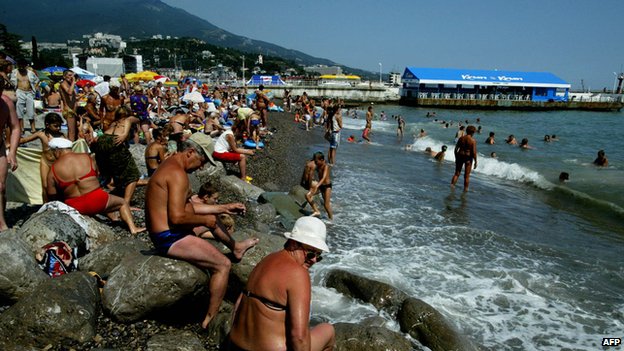
The Crimea of Russia's imagination - PHOTO
By Ruth Maclennan
Follow us !

